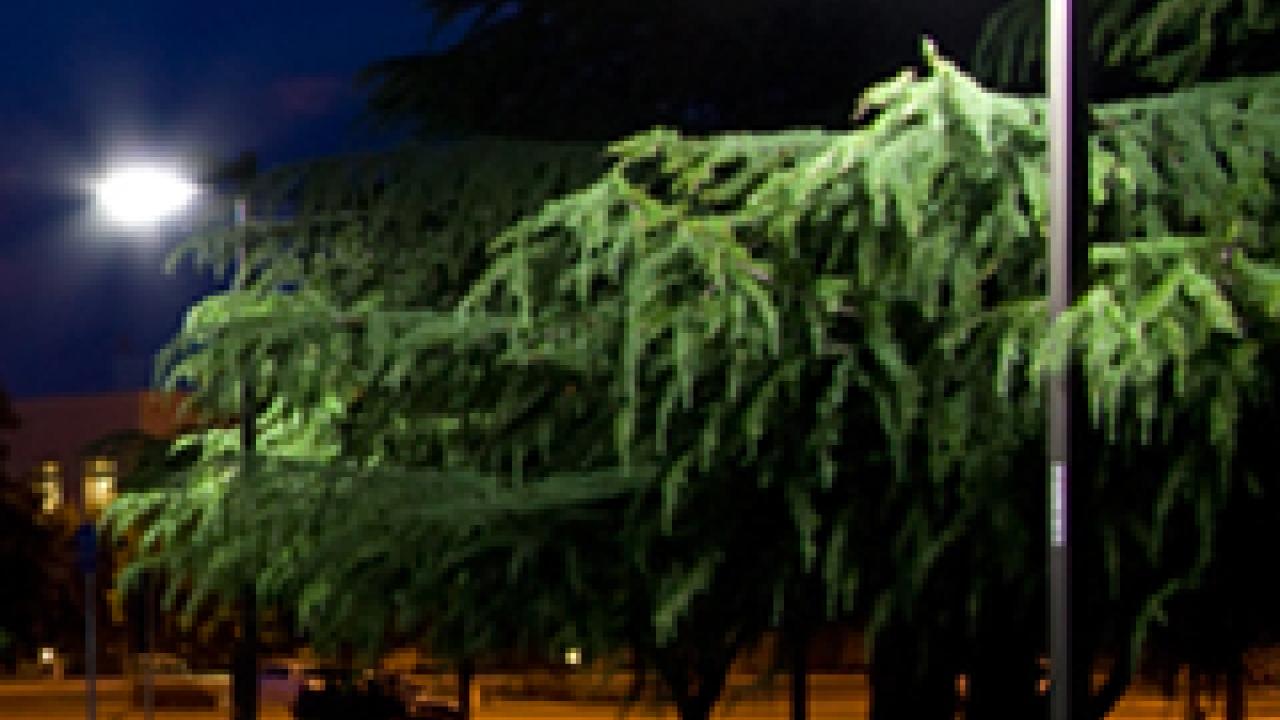The University of California, Davis, today turns on a new Smart Lighting Initiative to slash the amount of electricity it uses to illuminate its buildings and grounds. UC Davis is the first large institution in California to act on a September state mandate to reduce lighting energy use by 60 percent or more by 2020.
What’s more, the university intends to reach that goal in half the time -- by 2015. It has a good start: Since 2007, it has already reduced lighting energy consumption by about 10 percent.
Overall, the California Public Utilities Commission estimates that lighting accounts for 25 percent of California’s electricity use. At UC Davis, that figure is 29 percent and falling.
Cutting the energy used for lighting is key to California's efforts to reduce the amount of greenhouse-gas emissions it generates when it burns fossil fuels for electricity.
UC Davis Smart Lighting projects are based on innovations developed or refined by designers and engineers at the UC Davis California Lighting Technology Center and implemented by UC Davis’ forward-thinking Facilities Management team.
“UC Davis is uniquely able to serve as a model for virtually anyone who uses electric lights in California,” said Michael Siminovitch, director of the lighting center and a professor of design. “We are innovating lighting in our own campus residences, offices, classrooms, laboratories, human and animal medical centers, wineries and breweries, parks, greenbelts, barns, and parking lots.
"If you are trying to cut your carbon footprint and lighting costs, you can find help here.”
California Public Utilities Commission President Michael R. Peevey said UC Davis is the first institution to commit to achieving the lighting efficiency goals called for in the California Long-Term Energy Efficiency Strategic Plan.
“Advanced lighting technologies represent a win-win for our economy and the environment. By changing to more efficient light fixtures, bulbs and sensors, Californians can reduce the amount of energy they use and save money while simultaneously advancing our efforts to address climate change,” Peevey said.
“There are dozens of affordable lighting options on the market, and more arriving daily, thanks in no small part to the efforts of UC Davis and its leadership in the areas of energy efficiency and sustainability.”
Many of the technologies being highlighted at UC Davis were developed in partnership with the Public Interest Energy Research program of the California Energy Commission, Siminovitch noted.
UC Davis innovations are already in place throughout the state.
At other California college campuses, UC Irvine is undergoing a campuswide exterior retrofit. Smaller projects are under way at UC campuses in Santa Barbara and San Francisco; California State University campuses in Sacramento, Chico, San Francisco, Sonoma and San Luis Obispo; and Butte Community College in Chico.
Beyond campuses, UC Davis innovations are being implemented at state agencies such as the California Department of Motor Vehicles headquarters in Sacramento and the California Department of Public Health in Richmond, as well as national agencies in California, such as the Bear Valley Visitor Center at Point Reyes National Seashore and the National Guard Headquarters in Sacramento.
Working with the UC Davis California Lighting Technology Center, the UC Davis Facilities Management team already has installed lighting energy-saving projects including:
• Light-emitting diode (LED) overhead lights with two brightness levels, controlled by occupancy sensors, in campus parking structures;
• Bi-level induction lighting, also controlled by occupancy sensors, in campus parking lots and structures;
• Induction lights in streetlight fixtures on the north entry road (Howard Way);
• "Hybrid" bathroom lights that combine LED night lights with conventional lights and occupancy sensors in Emerson Hall and Webster Hall dormitories;
• Bi-level LED overhead lights in Bainer Hall corridors;
• Advanced compact fluorescent lights (CFLs) in Meyer Hall downlights;
• LED desk lamps and bi-level overhead lights controlled by occupancy sensors, daylight sensors and people in Mrak Hall offices; and
• A unique mirrored sunlighting device to bring daylight into interior rooms at the campus’s new winery, brewery and food-processing complex.
The UC Davis Smart Lighting program is expected to cost $39 million. The California Statewide Energy Partnership Program will fund $4 million of the total. The remaining $35 million will be paid for by energy savings of $3 million per year.
The Smart Lighting Initiative is a key part of the UC Davis Climate Action Plan, said Sid England, assistant vice chancellor for environmental stewardship and sustainability.
Released in June, the plan documents current and future actions UC Davis is taking to reduce greenhouse-gas emissions and combat global climate change.
The University of California system has set a target for all 10 UC campuses to return to 2000 emission levels by 2014. UC Davis reached that goal in 2008, six years ahead of schedule, and hopes to reduce campus emissions by an additional 10 percent by 2014.
It is all part of California's effort to return to 1990 emissions levels by 2020, as required under Assembly Bill 32, the California Global Warming Solutions Act of 2006.
About the UC Davis California Lighting Technology Center
The center is a research and education facility that focuses on the application of energy-efficient lighting and daylighting technologies through research, development, demonstration, outreach, and education in partnership with utilities, manufacturers, end users, builders, designers, and governmental agencies. The center, part of the Design Program at UC Davis, was established through a collaborative effort of the California Energy Commission’s Public Interest Energy Research (PIER) Program and UC Davis, with support from the U.S. Department of Energy and the National Electrical Manufacturers Association.
Media Resources
Kat Kerlin, Research news (emphasis on environmental sciences), 530-750-9195, kekerlin@ucdavis.edu
Michael Siminovitch, UC Davis California Lighting Technology Center, (530) 757-3444, mjsiminovitch@ucdavis.edu
Sid England, UC Davis Administrative and Resource Management, (530) 752-2432, asengland@ucdavis.edu
